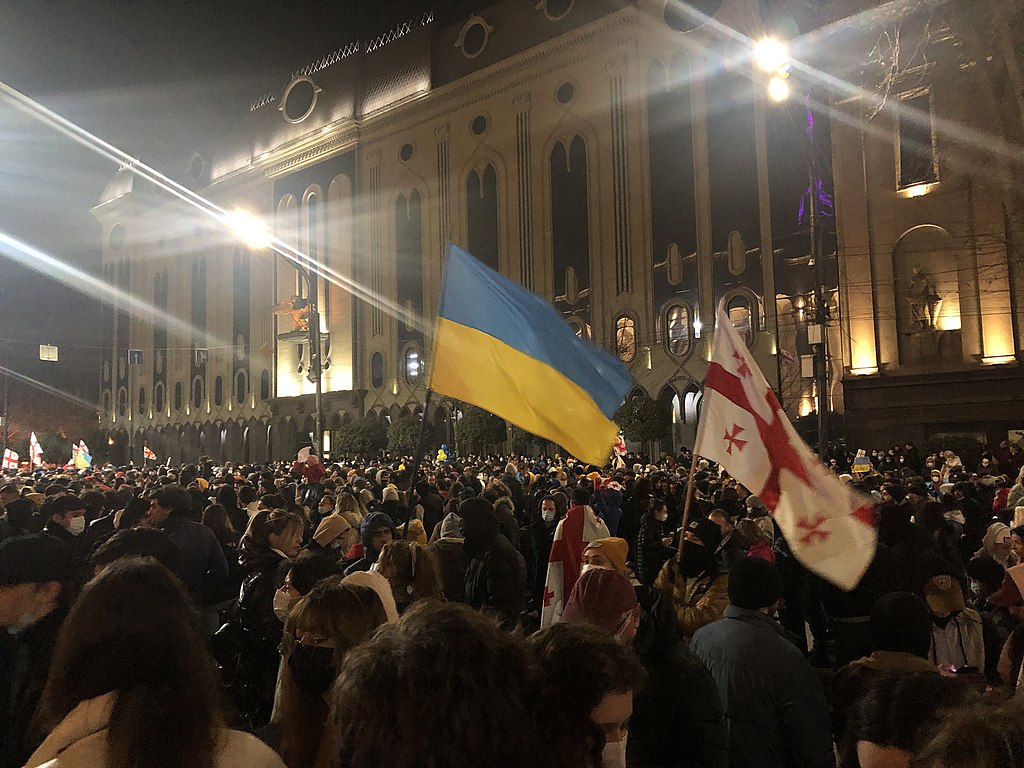Protests in solidarity with Ukraine earlier this year in Tbilisi, Rustaveli Avenue, on 26 February 2022 (source: WikiMedia Commons)
A new review by the end of 2022
The European Commission has said that Georgia still has to fulfill key conditions on political polarization, media freedom, judicial reform, and “de-oligarchization”, before granting a positive recommendation towards EU candidacy. Its incumbent Georgian Dream party is widely believed to be responsible for the democratic backsliding in the country and a rather ambiguous stance towards Russia. Georgian leadership has reluctantly condemned the Russian invasion of Ukraine and is engaged in a strategy of appeasement. It remains unclear if this could be explained through fear for Russian aggression, or the close ties of Georgian Dream party leaders to Russian business.
Earlier this week, Ukraine and Moldova did acquire a positive EU endorsement, leaving Georgia empty-handed. The Commission will review the case of Georgia again at the end of 2022 to “assess how Georgia meets the number of conditions before granting its candidate status.”
Disappointed protesters
Protesters in the streets of Tbilisi were disappointed by the ruling of the European Commission. “I came here to let our government know that we don’t want to be part of Russia. We want to live in a normal, European country,” said David, a 35-year-old demonstrator.
The leader of pro-European movement “Home to Europe” chanted, “We are here for an European future, we want to bring the country back to Europe!”. Many at the rally, which was organized by Georgia’s opposition parties, expressed their anger of ruling Georgian Dream party, that is blamed for the problematic EU candidacy bid.
“De-oligarchization”
Georgia has aspired EU candidacy status since the Russian invasion of its northern provinces Abkhazia and Northern Ossetia. It’s pathway to become candidate in 2024 had been accelerated due to the Russian invasion of Ukraine, subsequently handing in its EU bids alongside Moldova and Ukraine in March 2022.
The “de-oligarchization” of Georgian society will be presumably be the key condition for Georgia to acquire EU candidacy. The current government, led by the Georgian Dream party is under major influence of oligarch Bidzina Ivanishvili – whose capital equivalates one-third of Georgia’s GDP. Earlier in June, the European Parliament passed a nonbinding resolution that called for sanctions on Ivanishvili for his “destructive role” in Georgian politics.
Furthermore, the Georgian Dream-led administration has cracked down on media freedom, civil society and judicial independence. This all has been a major shake-up of Georgia being a frontrunning candidate for EU aspirations in Eastern Europe.
The 27 EU member states will discuss the applications of Ukraine, Moldova and Georgia on a 23-24 June summit. It will be unlikely that Georgia will officially acquire candidacy status by then – and its seems up to the incumbent Georgian Dream party to change this in the coming months.
Sources: DW Radio Free Europe Intellinews
Photo: WikiMedia Commons



